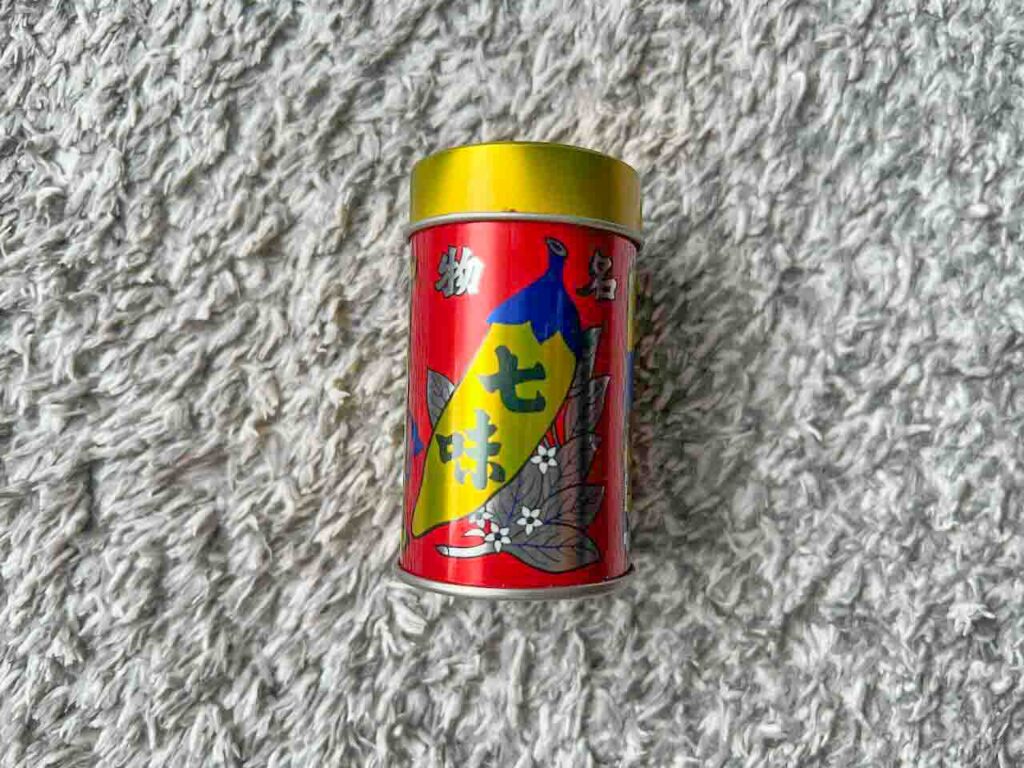Among Japan’s wide array of traditional seasonings, ichimi togarashi — literally meaning “one-flavor chili” — holds a special place for its simplicity, clean heat, and versatility. Unlike the more complex seven-spice blend shichimi togarashi, ichimi focuses entirely on the pure flavor of dried red chili peppers, delivering vibrant heat that enhances countless Japanese dishes.
In this article, we’ll explore the origins of ichimi togarashi, its health benefits and cautions, and how it fits into Japan’s distinctive condiment culture.
For a complete look at Japan’s traditional seasonings, visit:
👉 The Complete Guide to Japanese Condiments: Unlocking the Flavors Behind Japan’s Culinary Mastery
What Is Ichimi Togarashi?
Ichimi togarashi (一味唐辛子) is a finely ground or flaked red chili powder made almost exclusively from dried Japanese chili peppers (Capsicum annuum). It offers:
- A clean, sharp spiciness without competing flavors.
- A bright red color that adds visual appeal to dishes.
- A focused heat level that can be easily adjusted by quantity.
Unlike Western-style red pepper flakes often made from mixed pepper varieties (such as cayenne or jalapeño), ichimi togarashi is usually milder but cleaner in taste, making it perfectly suited for Japanese cuisine, where balance and subtlety are key.
Ichimi Togarashi vs. Shichimi Togarashi
While ichimi offers singular heat, its more famous counterpart shichimi togarashi (seven-spice chili blend) adds complexity with sesame seeds, sansho pepper, citrus peel, and other ingredients.
👉 Learn more about shichimi’s rich flavor profile here:
Shichimi Togarashi: The Japanese Spice Blend That Packs a Flavorful and Healthy Punch
How Ichimi Togarashi Is Used in Japanese Cuisine
Ichimi togarashi complements many traditional dishes by adding focused heat without overpowering delicate flavors:
- Udon and soba noodles: A pinch added to hot broth or dipping sauce.
- Yakitori (grilled chicken skewers): Enhances grilled meats with a bright, clean burn.
- Donburi (rice bowls): Adds contrast to rich ingredients like unagi (eel) or gyudon (beef bowls).
- Miso soup: A small dash balances the umami richness of dashi-based soups.
- Tofu dishes: Brightens cold or hot tofu preparations with gentle spice.
Its minimal ingredient list also makes ichimi popular for people who want pure heat without complex seasoning profiles.
Nutritional Value and Potential Health Benefits
While typically consumed in tiny amounts, ichimi togarashi offers notable nutritional and health-related properties thanks to its main bioactive compound: capsaicin.
Key nutrients found in red chili peppers include:
- Vitamin A (supports vision and immune function)
- Vitamin C (boosts collagen production and immunity)
- Vitamin B6 (supports metabolism and brain function)
- Potassium and Magnesium (important for heart and muscle function)
- Iron (supports oxygen transport in the body)
- Antioxidants (help reduce oxidative stress)
Health benefits of ichimi togarashi may include:
- Metabolism support: Capsaicin can mildly increase calorie burning and fat oxidation.
- Anti-inflammatory effects: May help reduce chronic inflammation.
- Cardiovascular support: Early studies suggest potential for lowering blood pressure and improving circulation.
- Digestive stimulation: Capsaicin can encourage gastric secretions and aid digestion (for those who tolerate it well).
Risks and When to Be Cautious
As with all spicy foods, ichimi togarashi requires moderation, especially for individuals sensitive to capsaicin. Potential concerns include:
- Digestive irritation: May worsen gastritis, acid reflux, ulcers, or IBS.
- Heartburn: Spicy foods can relax the esophageal sphincter in some people.
- Allergies: Rare but possible in individuals sensitive to the Capsicum family.
- Medication interactions: High doses of capsaicin may affect certain medications — consult a doctor if uncertain.
Safe Usage Guidelines:
- Start with small amounts.
- Avoid eating late at night if prone to heartburn.
- Pair with protein or fat to buffer the burn.
- Always wash hands after handling chili powder.
Ichimi Togarashi in Japanese Food Culture
Ichimi embodies the core values of Japanese culinary philosophy:
- Simplicity: Just one ingredient delivering pure heat.
- Balance: Used sparingly to complement rather than dominate.
- Aesthetic harmony: Its vivid red color enhances visual presentation.
Much like wasabi and karashi, ichimi reflects Japan’s artful ability to layer sharp, transient sensations that elevate — rather than mask — natural food flavors.
👉 You may also enjoy learning about how other sharp Japanese condiments work, such as:
- Wasabi: The Health Benefits and Nutritional Value of Japan’s Iconic Pungent Root
- Karashi: Japan’s Pungent Mustard and Its Role in Japanese Cuisine
Conclusion
Ichimi togarashi is far more than just “red pepper flakes” — it is a refined, minimalist expression of Japanese spice culture. Its focused heat, vivid appearance, and delicate balance make it a cherished condiment that can elevate everything from noodles to grilled meats.
Used thoughtfully, ichimi brings both sensory pleasure and subtle health benefits, offering a perfect example of how Japanese condiments celebrate both flavor and wellness.


